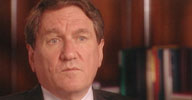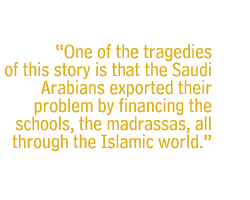 |  | ||||||||
| |||||||||
What does the fact that 15 of the Sept. 11 hijackers are Saudis tell us? It's a rather important fact. It tells you a great deal about the fissures in Saudi society, plus the fact that bin Laden's a Saudi, also the fact that these are not poor disadvantaged teenagers from the intifada, from the Gaza camps, or from the camps in Peshawar. These were people that, for the most part, could have made it in the modern globalized world. Mohamed Atta graduated from Hamburg Technical Institute with high honors. His father was a distinguished doctor. Osama bin Laden's from a very rich family. His Egyptian number two is from a very distinguished family. The father and grandfather are very important prominent people in Egyptian history and society. These are your classic alienated radical intellectuals who are pursuing wild radical intellectual dreams, and carrying them to extremes. ... They're very dangerous men. They do tend to come from Egypt and Saudi Arabia, and that is very indicative of the fissures in those societies. But those are our allies. Yes, but these are countries that are facing the dilemma of modernization, poverty, fundamentalism. As countries grapple with modernization, people who are left behind tend to hold firmer and firmer to their view of the evil of modernity. There's a long intellectual tradition of this in Egypt. They killed Sadat. They tried to kill Nasser. And they tried to kill Mubarak. So all three of the Egyptian presidents in the last 50 years have been targets of these people, and they succeeded in one case. They would kill the Saudi [royal family]; they would kill Yasser Arafat. They'd kill Musharraf in Pakistan in a second if they could. |
| ||||||||
|
You said they would kill the Saudi royal family. But it appears more and more that there seems to be sympathy running for them in Saudi society. Sympathy for them in Saudi society? I think Saudi society is split. Egyptian society is split. There is a split between Muslims who want to practice their faith in peace and tolerance with other religions and other people, and these extreme, radical fundamentalists who have shown a total lack of tolerance for people with different views, starting with people who they don't think are good Muslims, and going on to include Christians and Jews.
I think that one of the tragedies of this story is that the Saudi Arabians exported their problem by financing the schools, the madrassas, all through the Islamic world. I saw this in Uzbekistan a few years after Uzbekistan got out of the Soviet Union, became an independent state in cities like Tashkent and Samarkand, where the Saudis were funding these schools teaching Koranic studies and creating a class of people for whom education was simply the Holy Book, the Koran. ... What happened here was that the Saudi Arabian government had two wings. The mainland Saudi leadership went into financial issues, defense issues, and they controlled the elite establishment in order to purchase support. From the more fundamentalist religious groups, they gave certain other ministries, the religious ministries, education ministries, to more fundamentalist Islam leaders. And that's how the split occurred. So the Saudi government was, to a certain extent, pursuing internally inconsistent policies throughout this period -- reaching out to the West with sophisticated, well educated, internationally minded leaders like its foreign minister, like its ambassador in Washington and others. At the same time, it was funding with this vast oil revenue a different set of efforts: education, which was narrowly based in the Koran. ... Are the Saudis really in trouble? I think Saudi Arabia has a problem. And because of the unique closeness of relations between us and Saudi Arabia, we've got a problem with them, which we have to solve. The terrorists [of] Al Qaeda and Osama bin Laden are a direct threat -- not only to the United States -- but even more so to the House of Saud. And they have tried to deal with it by exporting it. They didn't want Osama bin Laden back when the Sudanese offered him up about three years ago. The bin Laden family is a powerful family in Saudi Arabia, as is well known. And the Saudis have been sitting on a lot of internal contradictions for a long time. But for the time being -- and I need to stress this -- I think that any effort by the United States to undermine the Saudi royal family would backfire. It would create more anarchy, more chaos, and we need to be very careful about what we do in a situation which would not be benefited by additional instability in the region. As for the long-term situation in Saudi Arabia, that's a significant problem to which I don't have an easy solution. One solution people are talking about is that we have less dependence on oil. Then we wouldn't have to worry about them. If you believe, as I do, that our problems should be less dependence on oil, foreign oil, then the one president in our lifetime who really attacked this problem head on was Jimmy Carter with his Project Independence. And that project, which was designed to reduce our dependence on foreign oil over a 10-year or 20-year period, was abandoned the minute his successors took power in 1981. I think that was a great tragedy. ...
home · introduction · interviews · analyses · haroun fazul · chronology photo copyright © afp/corbis | |||||||||


 The dominant form of Islam in Saudi Arabia is a fundamentalist group who
have internationalized their views using Saudi money, because there's a lot of
money around. And that's become a sort of swamp, if you will, for breeding
these people.
The dominant form of Islam in Saudi Arabia is a fundamentalist group who
have internationalized their views using Saudi money, because there's a lot of
money around. And that's become a sort of swamp, if you will, for breeding
these people.